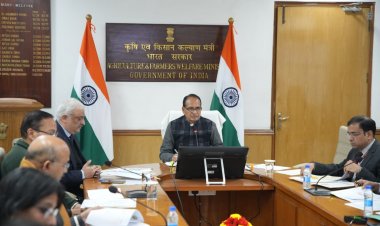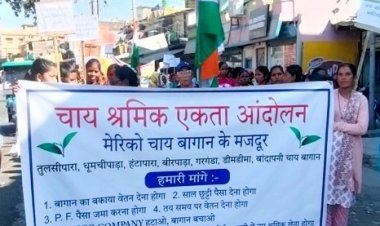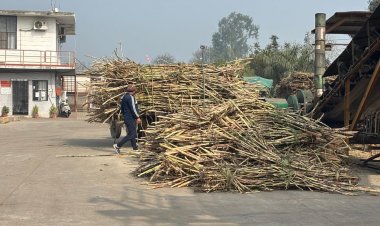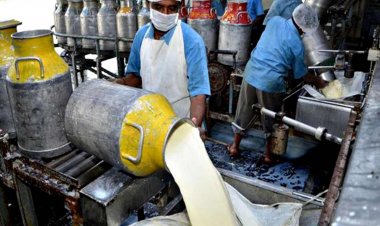Farm laws- Fighting over ghost Shadow
Farm unions protesting the recently enacted three contentious farm laws have rejected the latest offer of the Union Government to put these legislations on hold for 18 months and form a joint committee to examine all agitation related issues
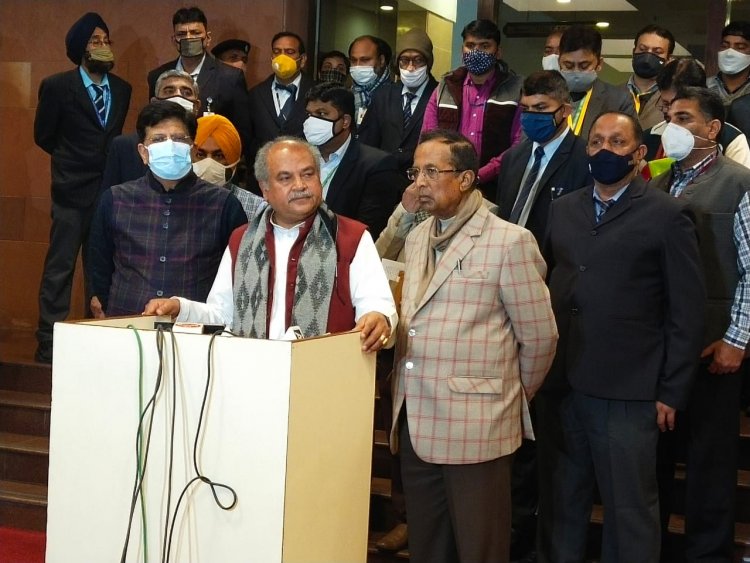
Farm unions protesting the recently enacted three contentious farm laws have rejected the latest offer of the Union Government to put these legislations on hold for 18 months and form a joint committee to examine all agitation related issues. This stand of the farm unions was not on unexpected lines because the farm unions have been very clear on the demand for repeal of these laws since day one of the agitation. The Government moves and offers are being perceived by the agitating farm unions as “divert and delay” tactics and has further deepened the dark cloud of mistrust, desperation and confusion created over these farm laws.
The stated objective of these laws is to ease restrictions in farm trade, allow traders to stockpile large quantities of food stocks for future trade and lay down a national framework for contract farming. The Government has been using every possible method to convince the farmers about the far-reaching benefits of these laws and how it will transform their fortune and future. The agitating farmers, on the other hand, have been denouncing such rosy dreams saying that these laws will erode their bargaining power and leave them at the mercy of big corporates. They have, therefore, been demanding a repeal of these laws and a legal guarantee for Minimum Support Price (MSP). The Government also mounted an aggressive counter-campaign to convince those farmer groups who are already in favour of these laws. Such moves and counter campaigns further aggravated the level of disconnect and distrust between agitating farmers and the Government. The element of “human warmth, emotion and connect” was conspicuously absent in all the attempts made for resolving the issues. What the Union Government offered in the 10th round of negotiations and what decision Hon’ble Supreme Court gave on 12 January, 2021 should have been done at the beginning of the agitation. This would have created the desired level of trust and comfort to take the negotiation further on a positive track and amicably resolve the issues. Tragic death of more than 60 farmers, sufferings of lakhs of agitating farmers and loss of more than Rs.50,000 crores to the trade and business could also have been averted.
Is there no alternative?
Unity, stamina, gut, commitment and confidence of agitating farmers deserve a big salute but I wonder is the agitation worth the price which the farmer and the nation is paying?
In my view the answer to this question is a big ”no”. The rigidities in the stand adopted by both sides i.e. the Government and the agitating farmers are emanating more from apprehensions and aversions than the realistic ground situations. It will be very difficult and unviable to take the disputed provisions of these laws i.e. contract farming, direct purchase by corporate and creation of parallel mandis to the ground. Given the small and fragmented size of land holdings and connect of more than 100 crore population with the villages, it will be unviable and non-feasible for any corporate to aggregate small pieces of land and enter into contract farming. The cost of this operation will far exceed the gain and it also runs the risk of becoming unmanageable. Presuming that even if an over enthusiastic corporate is able to aggregate the land through use of Government machinery and daggling the carrot to the farmers how will it constructively and viably engage the large number of population displaced from farming occupation. If not constructively and gainfully engaged, this large number of working population can create monstrous problem for carrying out the contact farming operations.
Another major point of contention is direct purchase by the corporate. This is also unviable and non-feasible in Indian context. The marketable surplus for majority of farmer household is very small (in most of the cases not exceeding one quintal) because of smaller size of land holding and prevalence of marginal farmers. Even now most of the farmers do not directly sell their produce in Mandies. In large parts of our country 3 to 4 tier aggregator system is functional and a corporate will find it more easy and profitable to operate through these aggregators. Why will anyone engage in cooking the food when he has choice of getting better food at lesser cost with no hassles?
Then what should be done? In my view the best course of action at this stage will be that the Government being the guardian of the nation should demonstrate a large heart and compassionate approach by repealing these contentious farm laws and set up a joint committee comprising of members from the concerned areas including members from the farmer unions protesting these laws to draw a comprehensive all encompassing charter of agrarian reforms which is acceptable to all the stakeholders and meets the future requirement of nation. With this step, the Government can assuage the apprehensions and win over the heart of its citizens and farmers whose collective prestige is the prestige of the Government. India needs bold agriculture reforms but it has to come through a process of dialogue, trust and complete connect with the needs and aspirations of its farmers. Within the time line of 18 months, the Government can definitely arrive at a consensus for introducing new and bold set of agriculture reform measures which can take the agriculture to a higher level of growth and development.
Inefficiency of legislative route!
Legislative route to address developmental issues are not efficient and preferred route and should not be resorted to unless it is absolutely essential and there is no alternative. Development and happiness is more a matter of heart which requires requires flexible approach and complete (physical, emotional and psychological) devotion and engagement among all its participants. Developmental policies and measures should ideally be outcome oriented. Legislative approach is basically process oriented and its implementation is mostly rigid and inflexible. Adherence to the legal clauses gets precedence over the outcome and response time for seeking correction and redressal is often too long. Legislations have a cumbersome rigid implementation framework and responsibility for its implementation is in the hand of those who are not the direct beneficiary of its outcome. The beneficiaries are merely the mute spectators who are at the mercy of the masters. This not only hinders voluntary and active participation of the beneficiaries but also alienates and disengages them. Failure of cooperative institutions in India is an example to appreciate this view.
It is an undisputed fact that cooperative institutions cannot fail provided it runs on sound and genuine cooperative principles. Yet lakhs of cooperative societies in India has either failed or are in dormant state due to extraneous reasons and external control and influence. Government could have done well to have reviewed and amended the regressive cooperative laws which have brought cooperatives to this state of affairs. This could have helped the Government to achieve the objectives which it intends to achieve through the contentious farm laws.
There is no denying of fact that farming has become unviable for majority of farmers in our country. The solution lies in aggregation of land holdings but this need to be done voluntary by the farmers themselves through formation of their own farm collectives. Our country requires at least one farm collective per village. This has to be done urgently and it is possible to achieve this in a two year time frame. The Government sponsored model of direction and financial incentive based model of promoting farm collectives is not a solution and is going to be very successful because this will encourage the external entities to take control of the programme. The Government should take a back seat and act only as a facilitator to encourage the interested and concerned such as the farmers, corporate, agri universities and research institutions, KVKs, banks and development finance institutions, rural development institutions, charitable and philanthropic institutions etc. to come together for creating such massive network of farm collectives throughout the country in a two year time frame. This should be given the shape of mass movement and can be termed as freedom movement for the farmers. Government may incentivise this movement by giving fiscal incentives in the form of tax concessions and the expenditure incurred by the corporate can be reckoned towards CSR expenditure. This will empower the farmers to engage with market forces on equitable and beneficial terms.
There is no denial of the fact that our farm sector is in crisis and there is an absolute urgency for finding solution for mitigating farmer distress. In a destabilised and distressful condition even the rich can not ensure their earning and safety of their wealth. The situation and learning from the ongoing farmer agitation should be seen and used as an opportunity for arriving at a consensus driven comprehensive sets of policy and programmes to address the entire gamut of issues plaguing farm and rural sector.
(Writer is former Deputy Managing Director of National Cooperative Development Corporation NCDC. Views expressed are personal)



 Join the RuralVoice whatsapp group
Join the RuralVoice whatsapp group



































